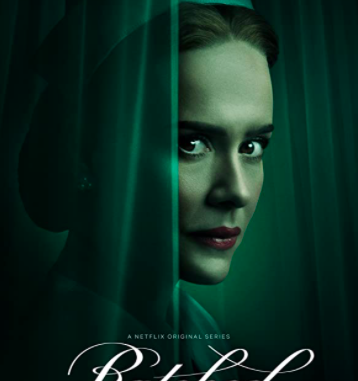
On Sept. 18, Netflix released the original series “Ratched”, created by Evan Romansky and developed by Ryan Murphy (“American Horror Story,” “Glee”).
The story starts with Mildred Ratched, a former wartime nurse, arriving at Lucia State Hospital in California. Her motives are unclear, her gaze is mysterious and her austere manner is jarring. Soon deemed the “angel of mercy,” this prequel to Ken Kesey’s 1962 novel, One Flew Over the Cuckoo’s Nest, turns the villain into the anti-hero. Prequels love doing that, don’t they?
“Ratched” is a feminist piece. It is necessary that I say this from the getgo because when looked at through this lens, the series is powerful. Especially considering that the novel, though brilliant, is riddled with misogynistic undertones.
The feminist theme of “Ratched” stretches beyond the concept and into the casting. Murphy is no stranger to creating juicy roles for women (especially women over the age of 50). As with all of his work, it was a delight to see women delivering powerful performances in every moment of the series.
If one is to take the feminist lens away from their viewing however, “Ratched” is a trifle all over the place.
It all began with the trailer. The song “Big Spender” from “Sweet Charity” served as a (questionable) anthem behind what looked like a preview for Murphy’s own “American Horror Story.” This unfortunately led me to believe that “Ratched” would be somewhat of an off-brand version of the fan-favorite anthology series. Cut to the show itself: blood and guts at every turn, camp for camp’s sake and Sharon Stone doing what seemed to be her best Jessica Lange impersonation, did not help “Ratched’s” case. Sorry, Sharon.
To be fair, the series was developed by Ryan Murphy, so it made sense that it had the essence of his other work . . . @americanhorrorstory. However, while “Ratched” may have had the flavor of “American Horror Story,” it did have the aroma of something fresh. With strong themes of feminism, sexuality, mental illness and corrupt power, the piece was timely. However, the strong themes were at times overshadowed by the somewhat weak plot.
Originally portrayed by Louise Fletcher in the classic 1975 film adaptation of “One Flew Over The Cuckoo’s Nest,” Sarah Paulson had some big (nurses) shoes to fill, taking on the role of Nurse Ratched. I appreciated that Paulson conveyed the spirit of Ratched, that Fletcher created, without doing a cheap impersonation. Paulson brought herself to the character, giving a robust performance. I wouldn’t say that I was always rooting for Ratched, but I don’t know if I was supposed to be. I was more intrigued by the intricacies of the character that Paulson so effortlessly illuminated.
As great of a job as Paulson did, the standout performance was, without a doubt, given by Judy Davis, who played the deliciously chaotic Nurse Bucket — Ratched’s rival. With every movement and every line, Davis arrested each scene she was in. Her comedic timing, her commanding presence and her vulnerability reminded me of the joy that is watching great acting.
Production designer Judy Becker and costume designers Lou Eyrich and Rebecca Guzzi tied the whole project together. Set in the late 1940s, the show pays homage to the whimsy of Technicolor. Simply stated, the series is an interior designer’s wet dream and a fashion designer’s heaven on earth.
The horror that is misogyny and oppression of the LGBTQ+ community is more disturbing than the gouged out eyes and the severed limbs. The knowledge that the depicted oppression was in our recent history and still lingers today, eats at you from the inside out. “Ratched” is an investigation into the world of mental illness, boldly questioning what it means to be sane versus what it means to be ill.
Midway through the series, Ingrid (Harriet Harris), a former opera singer — hospitalized for being a lesbian — cries, “You don’t know what it’s like to be constantly running from who you are.” On some level, we all know what that is like. This is the heart of the piece and what makes “Ratched” so moving and worth the watch despite its flaws.
Rating: 6.5/10
